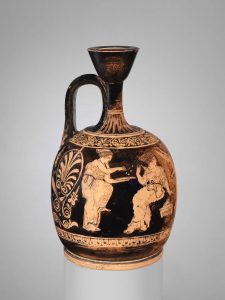Chapter 14: Thebes
Previous Page Table of Contents Next Page
♦ New York, Metropolitan Museum, 11.213.2: Attic red figure lekythos by the Meidias Painter with Aphrodite, Eros, Chrysippos and Pompe

Aphrodite, Eros and Chrysippos (all named)

Unnamed woman and Aphrodite

Chrysippos and Pompe (named)
Beazley Archive Pottery Database
♦ Berlin, Antikensammlung, 1968.12: Apulian red-figure bell krater with Laios’ abduction of Chrysippos, and Chrysippos’ father Pelops

ANTIKENSAMMLUNG, STAATLICHE MUSEEN ZU BERLIN—PREUSSISCHER KULTURBESITZ—Foto Ute Jung
Rome, Ministero per i Beni e le Attività Culturali (formerly Malibu, J. Paul Getty Museum 77.AE.14): Apulian red-figure volute krater with abduction of Chrysippos by Laios, and Chrysippos’ father Pelops
Beazley Archive Pottery Database
Digital LIMC (no photos)
♦ Rome, Museo Nazionale Etrusco di Villa Giulia 13199: Praenestine cista (Barberini cista) with abduction of Chrysippos by Laios

A. della Seta, Museo di Villa Giulia 1 (1918), pl. 60
Digital LIMC (with photos)
♠ Od 11.271-73 – Homer, Odyssey
And I saw the mother of Oedipodes, fair Epicaste, who wrought a monstrous deed in ignorance of mind, in that she wedded her own son, and he, when he had slain his own father, wedded her. Greek Text
♠ Pherekydes 3F95 FGrH– Die Fragmente der Griechischen Historiker 1, p. 86, ed. F. Jacoby. 2d ed. Leiden 1957.
Pherekydes records Oidipous’s children and wives as follows: “Kreon,” he says, “gives to Oidipous the kingship and Laios’s wife, also Oidipous’s mother, Iokaste, from whom Phrastor and Laonytos are born to him, who are killed by the Minyans and Erginos. And when a year has gone by, Oidipous marries Euryganeia daughter of Periphas, from whom are born to him Antigone and Ismene, whom Tydeus kills over a spring, and the spring is called Ismene after her. And Eteokles and Polyneikes are his sons from her. And when Euryganeia has ended, Oidipous marries Astymedousa daughter of Sthenelos.” (Transl. Silvio Curtis) Greek Text
♠ Hepta 742-49 – Aischylos, Hepta (Seven Against Thebes)
Indeed I speak of the ancient transgression, now swift in its retribution. It remains even into the third generation, ever since Laius—in defiance of Apollo who, at his Pythian oracle at the earth’s center, said three times that the king would save his city if he died without offspring. Greek Text
Previous Page Table of Contents Next Page
Tags
Artistic sources edited by R. Ross Holloway, Elisha Benjamin Andrews Professor Emeritus, Joukowsky Institute for Archaeology and the Ancient World, Brown Univ., and Frances Van Keuren, Prof. Emerita, Lamar Dodd School of Art, Univ. of Georgia, August 2020
Literary sources edited by Elena Bianchelli, Senior Lecturer of Classical Languages and Culture, Univ. of Georgia, March 2020
866 total views, 1 views today